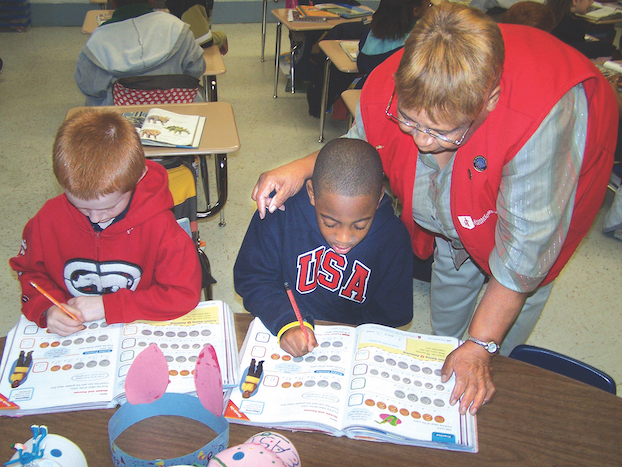Wanted: Foster grandparents to work with at-risk students
Published 6:09 am Tuesday, December 6, 2022

- A foster grandparent helps a student with an assignment on nickels and pennies. (Special to the American Press)
FGP was first developed in 1965 through a partnership between the Office of Economic Opportunity and the Department of Health Education and Welfare. SWLA adopted the program in 1999 to benefit both students and low-income citizens aged 55 and above.
This program facilitates impactful relationships between mentors and local students. The volunteers work one-on-one with the students who need extra support in math and reading. Ultimately, the program aims to bring students up to their targeted reading level, and score at least “Above Basic” level on LEAP and iLEAP standardized tests.
This program also aids students in improving their self-esteem and self-confidence “by continually praising and encouraging them,” said Kathy Richard, program director. “They praise every accomplishment no matter how small.”
According to a BBBSWLA press release, “For many children, this may be the only praise they receive throughout their day, apart from their teachers… for a child that is struggling to learn, what a wonderful thing it is for them to have a foster grandparent to sit with them while they work; not to judge, but to encourage and help them strive.”
AJ Fontenot, FGP program coordinator, explained that the presence of an older mentor aides in providing students well-rounded instruction and development. “They help shape a kid’s future by sharing life experiences and by offering the knowledge, love and patience that can only come from a grandparent.”
“Grandparents tend to have more patience with children, and are more likely to give praise more easily,” seconded Richard. “They tend to listen to the children with open ears and open hearts.”
At-risk students are selected for the program by the schools’ teachers and counselors.
This process is a positive experience for the volunteers as well as the students. “Not only do the children benefit from having a foster grandparent working with them, but the grandparents benefit by being able to get out of the house and becoming useful once again by serving their community in a meaningful way,” said Richard.
She continued by explaining that most foster grandparents also receive monetary benefits. Through funding from a federal grant through AmeriCorps Seniors, the program is able to provide stipends. “By receiving this non-taxed stipend, the grandparents have extra money for medicines or bills that their monthly income may not fully cover,” she said. “Or, it may give them pocket money that they may not have after paying their bills.”
Currently, SWLA has 47 active volunteers. As compensation for their time, volunteers receive a non-taxable stipend of $3 an hour, and can work 20 to 40 hours a week. In addition, volunteers receive mileage reimbursement.
To qualify as a grandparent, volunteers must be over the age of 55. A minimum of 20 hours of work a week is required to receive the stipend.
Applicants are required to pass a 3-tier –State, FBI fingerprinting and Sex Offender Registery – background check, verification of income, physician’s statement and TB test. They are also required to complete 20 hours of orientation training.
Grandparents that are interested in becoming non-stipend volunteers are only required to work a minimum of seven hours per week.
FGP serves students in Calcasieu, Acadia, Vernon and Jeff Davis parishes, which includes one nonprofit daycare, two head start programs, 16 elementary schools and two after-school programs.
To apply for the program or for more information, contact Richard at krichard@bbbsswla.org, 337-478-5437 or 337-707-4183.




